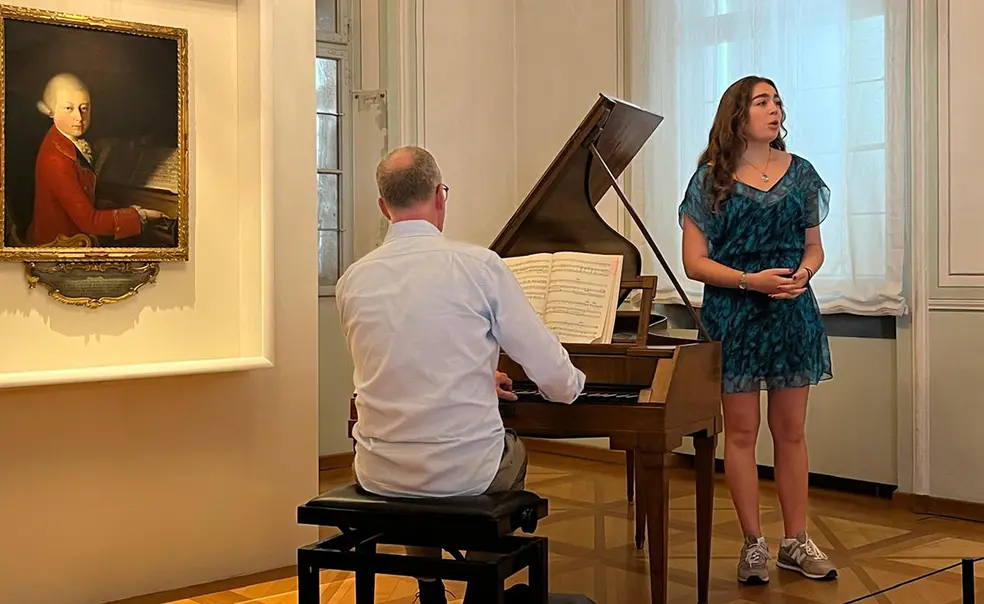Princeton Students Sing Praises of Salzburg Opera Festival
A group of Princeton students attended the Salzburg Festival in Austria for the first time this summer for a week and a half of operas, concerts, and discussions about the performances they attended.
Rubén Gallo, the Walter S. Carpenter Jr. Professor in Language, Literature, and Civilization of Spain and a professor in the Department of Spanish and Portuguese, led the group of 10 undergraduate students with the help of Friederike E. Ach *25, a lecturer in the Department of Comparative Literature.
Gallo regularly teaches Opera and Politics at Princeton and leads Global Seminars to Austria. Over the years, he has observed that many students, even those who knew little about opera, became intrigued after taking his classes.
Attending operas “had a very therapeutic effect” on previous students, Gallo said. “And I noticed that it calmed them down. We had very productive discussions. Sometimes we were dealing with complex political issues, but the fact that it was opera made it a very civilized and a very collegial discussion.”

That sparked the idea for this year’s 10-day trip to the Salzburg Festival, which Gallo calls “the best opera festival in the world.” Located in Wolfgang Amadeus Mozart’s hometown, the festival has been held most summers since 1920, and aside from operas, it also hosts concerts and plays. It is held in conjunction with the Salzburg Forum, a parallel conference on cultural politics.
Although the trip was not for credit, students were tasked with giving a presentation and leading a discussion, usually over a meal. Aidan Gouley ’27, a politics major, said students would introduce an opera, usually just prior to the group’s attendance, and its plot, “but then also ask some critical questions” such as how it might be staged and its resonance today. Rather than historical analysis, conversations tended to focus on contemporary political issues — such as the Russia-Ukraine War and Israel-Hamas War.
“All of this was hard work,” said Gallo.
By the time the students returned to Princeton in late August, they had seen seven operas — such as Maria Stuarda, MacBeth, and Castor and Pollux — and two concerts, including one by the Vienna Philharmonic, but “more importantly, we just met really, really interesting people,” Gallo said.
Countertenor Aryeh Nussbaum Cohen ’15, who made his festival debut in Three Sisters, shared “war stories about being backstage” with the group, according to Gallo.
Talia Czuchlewski ’26, an aspiring opera singer who is majoring in comparative literature, said, “It was wonderful to get to talk to him and hear about the rehearsal process and hear about what it’s been like preparing for this role,” before they saw the show.
One of the highlights for the group was meeting Johannes Honsig-Erlenburg, president of the Salzburg Mozarteum Foundation. During a private tour of Mozart’s house, he asked Czuchlewski if she would like to sing music by Mozart as he accompanied her on Mozart’s own piano.
That experience “was crazy,” Czuchlewski said. “That was not what I expected to be doing on this trip, but I’m thrilled that it happened.” Czuchlewski performed again when the group visited Honsig-Erlenburg’s house.
Attending the festival was different than simply attending an opera, Gallo said, because “it’s this very intense week where everyone” — even waiters at restaurants — is “tuned to the same operas.”
“Everywhere you go, every person you met, opera was basically a lingua franca. What the students had seen, they could use to have a conversation,” said Gallo.
During most days, students had free time to explore before group meals and performances in the evening. Together, the group also visited Schloss Leopoldskron, the palace where the festival was first held, and hiked in the Alps, where Gouley said he walked about 30,000 steps.
“The hike took us up through the tree line to these really beautiful Alpine meadows,” he said. “We’re walking through these pastures alongside cows and such, with these really magnificent views out over these different valleys.”
Czuchlewski said the hike, which was about halfway through the trip, was restorative, and in addition, “I felt like it gave a more complete picture of what the culture of Salzburg and Austria is,” she said.
The trip was funded by the University’s Humanities Council through the Magic Grants for Innovation program, which “support[s] ideas that break new ground intellectually and pedagogically and have the potential to change how the humanities are conceived and taught,” according to the Humanities Council website. Most of the students who attended are sophomores, juniors, or seniors minoring in European Cultural Studies, which hosted the program.
At the end of their time in Austria, “we all felt like we were just floating in the clouds,” said Gallo. “It was beautiful. Basically all the stress, all the anxiety had been melted away, and we all felt that we are ready to come back to Princeton for a new semester reenergized.”












No responses yet